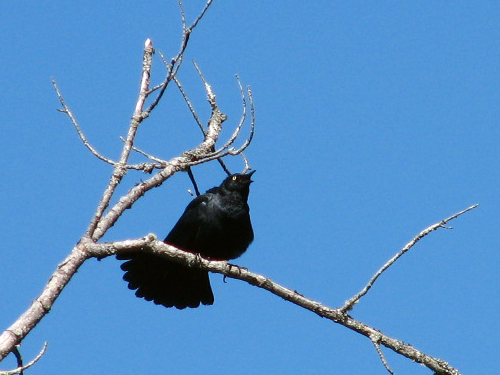
2018 Rusty Blackbird Project Photo Essay
Rusty Blackbirds have experienced a significant decline over the last four decades, and are the focus of research efforts in both the United States and Canada. Our work with this species began with participation in a regional roadside survey effort in 2009, when we discovered a concentration of breeding pairs in northern New Hampshire. In 2010, we initiated a long-term study of breeding distribution and density, nesting success and productivity, site fidelity and dispersal, and survivorship. Data from this population have contributed to three master’s theses, one Ph.D. dissertation, and collaborative studies of diet, genetics, blood parasites, and mercury levels.
Project partners include UMaine-Orono, UMaine-Fort Kent, UMaine-Presque Isle, the Silvio O. Conte and Umbagog national wildlife refuges, Maine Department of Inland Fisheries and Wildlife, and several forest management companies. Field research is focused in Coos County, NH, Essex County, VT, and Oxford County, ME. Project biologists are active participants in the International Rusty Blackbird Working Group and are working with colleagues from Alaska to Nova Scotia in the development of a full annual cycle model to guide conservation strategies for this species. We are also collaborating with entomologist Dr. Terry Whitworth of Puyallup, WA to explore the extent and effects of bird blow fly parasitism on Rusty Blackbird nestlings.
Download the Guidelines for Managing Rusty Blackbird Habitat in New York and Northern New England
Watch the NH PBS special about Lighthawk, a project partner that helps track bird location and movements by airplane.
Project Leader: Carol Foss, Ph.D.

